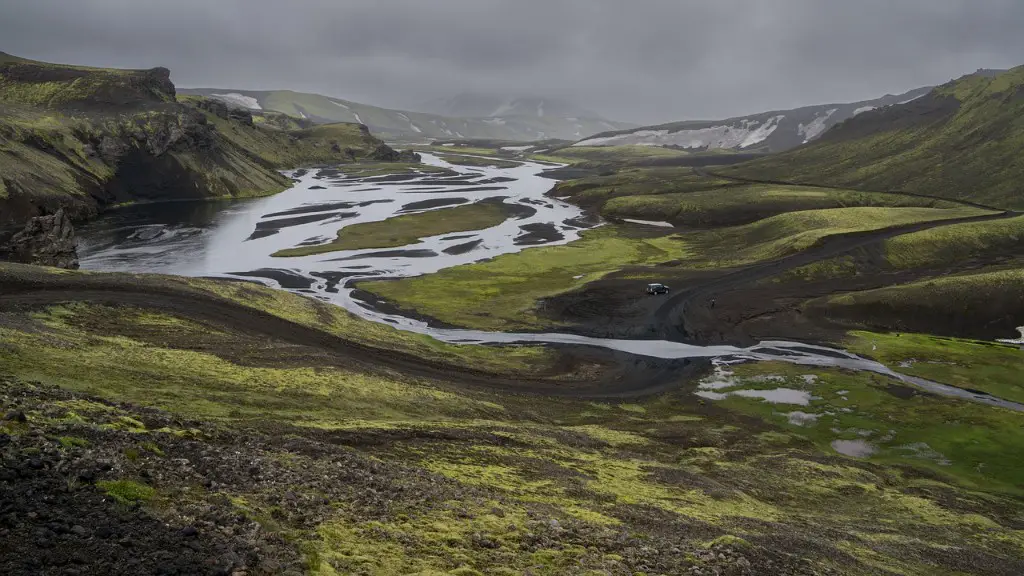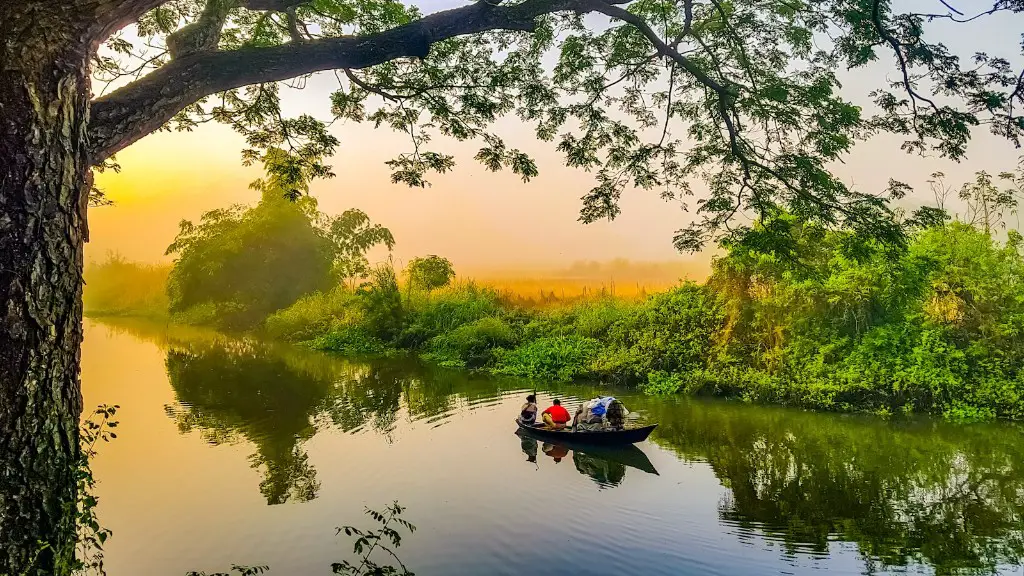The Mississippi River Valley was once a thriving hub for societies and communities of many different cultures. Each society shared the land and waters of the Mississippi and contributed to the development of a strong, unified culture in this region. Unfortunately, with the gradual introduction of European influences in the area, the original communities that flourished in the Mississippi River Valley were virtually wiped out in a short period of time.
By the year 1680 Europeans had established outposts along the river, hoping to colonize the region and benefit from the valuable land in the area. They quickly made contact with the Native Americans in the region and tried to convert them to Christianity and to incorporate them into their society. The Native Americans resisted these attempts and, ultimately, lost the struggle against the Europeans. The result was the near-extinction of these societies as they slowly disappeared and other European-American societies moved into the region.
The effects of this drastic change were devastating for both the Native American societies and for the land itself. The Europeans introduced their own system of commerce and land-use that disrupted the balance in the region. This system encouraged the exploitation of natural resources to benefit their own interests and the exploitation of the Native American populations. In addition, European disease caused widespread famine, death and displacement among the Native American societies.
In recent decades, though, there has been a gradual attempt to recognize and honor the past societies of the Mississippi River Valley. Efforts have been made to restore traditional Native American land rights and to educate people about the heritage and culture of the societies that once flourished here. In addition, some of the lost languages of these communities are now being revitalized and reintroduced as part of efforts to reclaim and preserve the culture of the region.
Despite these efforts, it is clear that the destruction of the original societies in the Mississippi River Valley has had a lasting impact on the region. The disappearance of these societies has resulted in vast environmental changes due to the unsustainable practices of the Europeans. In addition, the destruction of the Native American societies has resulted in vast cultural losses that are still felt today.
Changes in the Landscape
The destruction of the societies in the Mississippi River Valley also resulted in drastic changes to the landscape of the region. The Europeans brought with them new farming techniques, as well as new plants and animals, resulting in wide-scale deforestation, soil erosion and the destruction of wildlife habitats. The impact on the natural habitat of the region was profound, leading to the gradual disappearance of many of its once vibrant ecosystems, particularly in the wetlands.
The destruction of the Indian societies in the Mississippi River Valley also had a significant impact on the flora and fauna of the region. Native flora, such as the cypress trees, were heavily logged from the region as a result of the extensive timber industry of the Europeans. Similarly, the animals in the region were affected by the changes in human activity and the destruction of their habitats. Species like the bald eagle and the beaver, which were once abundant in the region, were gradually reduced in numbers. This loss of wildlife is still being felt today, as their former habitats continue to struggle to recover.
The destruction of the societies in the Mississippi River Valley also had a major impact on the cultural heritage of the region. The original societies of the area, with their unique languages and customs, have been replaced and all but forgotten by the newly established European-American culture. This is a major loss, not only for the descendants of the original Native American tribes, but also for the region as a whole.
Socio-economic Impacts
The destruction of the societies in the Mississippi River Valley has also had major socio-economic impacts on the region. Due to the introduction of new economic practices by the Europeans, Native American societies saw a drastic decrease in their overall economic opportunities and livelihoods. This had a devastating effect on their ability to sustain their societies, and ultimately led many of them to move to other parts of the country in search of better living conditions.
The destruction of the societies in the Mississippi River Valley has also resulted in other socio-economic problems in the region. The demise of the original societies has resulted in massive unemployment among the Native American populations, as well as poverty, inadequate housing and poor health for many individuals. This has resulted in a population that is largely excluded from the modern economy and lacks access to the basic resources and services necessary for a decent quality of life.
In addition, the destruction of the societies in the Mississippi River Valley has also resulted in the loss of much of the original culture and heritage of the region. The practices, customs and traditions of the original inhabitants have been replaced by the new systems of the Europeans and largely forgotten or ignored. This has had a major impact on the development of the region’s culture and overall identity, as the unique cultures of the original societies have been lost forever.
Responsibility and Accountability
The destruction of the societies in the Mississippi River Valley has also left many questions regarding accountability and responsibility for this tragedy. While it is clear that the Europeans were responsible for much of the destruction of these societies, the Americans who followed them have also played arole in this tragedy. Americans have yet to take full responsibility for their actions and, as a result, have failed to take appropriate measures to alleviate the suffering of the people of the region.
The destruction of the societies in the Mississippi River Valley has highlighted the importance of recognizing and respecting the rights of all communities, regardless of race or cultural background. The experience of the original inhabitants of the region has served as a stark reminder that all societies must be given the opportunity to develop and thrive in their own ways, free from outside interference or exploitation. As a result, it is important that all governments and communities take steps to ensure that such tragedies are not repeated in the future.
In addition, it is also important to recognize the legacy of the societies in the Mississippi River Valley. Though these societies have disappeared, the legacy of their culture and traditions still lives on in the minds and hearts of their descendants. It is important to remember and honour these societies, and to ensure that their experience is not forgotten or overlooked. Furthermore, it is also important that we learn from their experience and strive to create a better world for all people.
Preserving Cultural Heritage
The destruction of the societies in the Mississippi River Valley also highlights the need to preserve the cultural heritage of all communities. The experience of these original societies has demonstrated the importance of protecting traditional cultures and ensuring that they are passed down to future generations in order to ensure their ongoing presence and influence. There is a need to ensure that the unique cultures of all societies around the world are respected and preserved for the benefit of future generations.
Furthermore, the destruction of the societies in the Mississippi River Valley can also serve as a reminder of the importance of respecting all cultures and of allowing them to develop and flourish in their own ways. It is important that we recognize and honour the diverse cultures of the world and work towards ensuring that all communities are given the freedom to pursue their own visions for the future without oppression or exploitation.
Finally, the destruction of the societies in the Mississippi River Valley also highlights the need to recognize Indigenous peoples and their rights around the world. It is important that governments and communities recognize the importance of Indigenous knowledge and cultures, and take steps to protect and promote them. This includes the recognition of Indigenous land and resource rights, the provision of economic and social opportunities, and the support of Indigenous cultural activities and organizations.
A Call to Action
The destruction of the societies in the Mississippi River Valley serves as an important reminder of the need to take action to protect and promote the rights of Indigenous peoples around the world. It is essential that governments and communities take concrete steps to support Indigenous communities and to restore their rights and their traditional lands. This can include the implementation of policies and laws to protect Indigenous lands and resources, the provision of educational and economic opportunities, and the promotion of Indigenous culture and language.
In addition, it is also essential that the voices of Indigenous communities are heard and respected. Only by listening to and learning from Indigenous peoples can we come to understand the complexity of their cultures and traditions, as well as their vision for the future. This recognition of Indigenous voices is an important step towards taking meaningful action towards the protection and promotion of Indigenous rights and cultures.
Finally, it is essential that we learn from the experiences of the societies in the Mississippi River Valley and take steps to ensure that such tragedies are never repeated. This must include recognizing and embracing the unique societies and cultures of the world, and supporting the rights of Indigenous peoples everywhere. Only by taking action can we ensure that the unique cultures and traditions of the world are respected and protected, and that all communities are given the freedom to pursue their own visions for the future free from oppression or exploitation.





